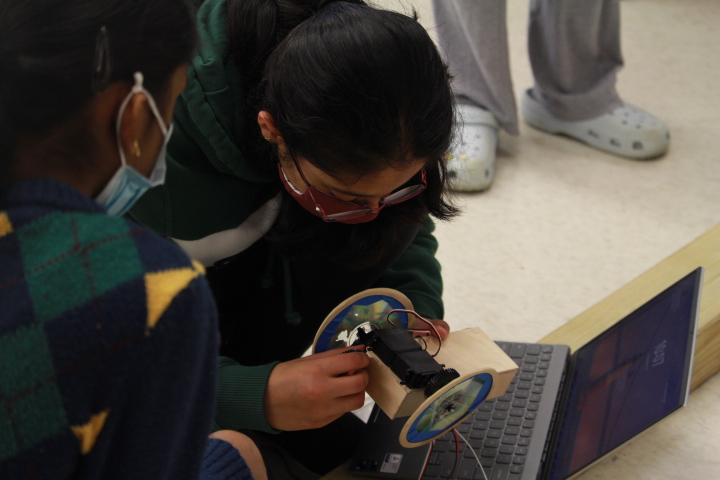Robot project needs revamping
Freshman Samhitha Maramreddy studies her robot the day before the showcase, about to test it in the maze.
March 30, 2022
Shoeboxes are everywhere.
For the past two weeks, you’ve probably seen dozens of students walk past with a shoebox in their hands and stress lining their face. A robot made of wood hot glued together and functioning with an Arduino would be inside that shoebox.
As one of the only projects that every freshman at Jefferson has to complete, the robot project is infamous for being incredibly difficult, stressful, and overall not the best experience. It is worth a total of 160 points in the gradebook and students often have little to no help from teachers.
The robot project has an incredibly long list of requirements and limits, but primarily includes building a hard-coded, 8-by-8-by-8 inch robot that will pass through a maze and compete in either speed or torque—previously beauty was also an option, but the category has since been removed. This all culminates to one student’s robot representing each Integrated Biology, English, and Technology (IBET) in a showcase that takes place during 8th period on the Friday before spring break.
In theory, this should be a time when freshmen are excited to learn and look forward to every Design and Technology class—after all, everyone is building a fully functioning robot from scratch with little to no previous experience. But the stress of it all on top of the freshmen IBET project and other classes makes having an enjoyable time engineering, building, and coding impossible.
Teachers tell you to breathe, relax, and have fun working on the project, but with a single robot being worth that much of a single grade, it’s an unrealistic expectation. Then, they tell you to ask for help when you need it.
One of those main avenues of help are upperclassmen. Considering the fact that this is a project every single freshman, every single year completes, there should be tons of students willing to give advice or lend a helping hand.
And in any ordinary school year, that would be true. However, due to coronavirus, the current seniors are the only Jefferson class that have completed the project. Most of the seniors have their senior research project to worry about in addition to their other classes, which can make it difficult to find time to help freshmen with their robot. It can also be difficult for freshmen to find seniors they are close enough to to ask for help, as they likely don’t have many classes with seniors to talk to.
Other students shouldn’t be expected to teach the freshmen how to build a robot—they have their own classes, tests, and projects to worry about. That responsibility should fall to the teachers.
However, very few teachers actually teach their students the skills necessary to build a robot, and aren’t very helpful when their students come to them for help. Students also aren’t supposed to get help from other teachers that aren’t their own Design and Tech teacher.
The robot project grade should be a combination of effort, completion, and content, not entirely based on the robot’s design and performance ability.
I understand why having a project as big as this based entirely on effort or completion is extremely difficult. But having the entire grade based on the result puts additional, unnecessary pressure on students who haven’t built anything of this sort before, which is most of the freshmen class.
In an ideal world, teachers would walk their students through how to code a robot, things to keep in mind that would help with speed or torque, and actually help them out with questions. But realistically, if a teacher hasn’t been doing that in the past, they likely won’t begin, and a student’s ability to build a functioning robot shouldn’t rely entirely on their past experience or whether they get a teacher willing to actually teach.
Ultimately, it is clear that the current robot project isn’t designed in a way that allows students to focus on understanding the craft and problem solving that this project requires, but rather the grades that are a result of it. Whether the solution is to adapt the way it is graded or the way certain teachers are teaching it, the robot project definitely needs to be revamped.










